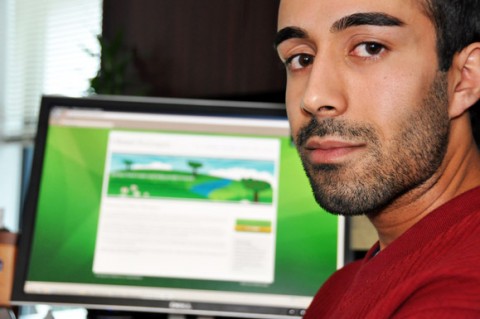UBC Okanagan student Raja Wariach has created a website that directly connects people in need of food with farmers and orchardists who have excess to give.
The website, http://www.gleanok.com/, was originally intended to be Okanagan specific. However, Wariach is currently in the process of expanding the website to include the entire country. He decided to do so after learning the concept was unique to Canada, and that the website was fairly easy to manage.
“This is a free service that allows food producers, such as a commercial orchardist or even a backyard gardener, to post online ads about their excess food and directly give it to people in need,” says Wariach.
“Just like putting an ad in the newspaper, you just simply describe what you are donating, the quantity you have, your location, and your contact information. People in need who visit this website will contact you directly to arrange a collection time.”
Wariach, a fourth-year human geography major, came up with the idea of “people-to-people gleaning” for his Community Food Security class term project. Having lived on an acreage much of his life, Wariach saw first-hand the food waste that occurs when events such as hail storms damage crops, and set out to find a way to salvage excess or unwanted food in an efficient and sustainable manner.
And although Wariach was only required to research the idea for his class, he decided to take it one step further and turn his idea into action.
Partnering with a friend who specializes in website design, Wariach used money from his own pocket to fund the project costs, and reached out to community groups, such as the Central Okanagan Healthy Food Council, to assess the viability of the web-based service.
“Many times a food product isn¹t marketable, but is still edible,” explains Wariach. “Traditional gleaning is very labour intensive as it requires volunteers to find, collect and transport food to facilities such as food banks. This website not only connects donors and people in need, it also helps volunteer groups with finding donors, if they want to try traditional gleaning as a volunteer activity.”
Wariach also contacted the local law firm FH&P Lawyers who created, pro bono, a suggested waiver that helps ensure the farmers and growers who offer their food in good faith are legally protected.
Wariach will participate in a panel discussion on Monday, March 8, as part of UBC Okanagan Celebrate Research Week. The discussion, “Walking the talk on sustainability: social responses to a climate changed planet,” also features:
-
Keynote Speaker Ujjayant Chakravorty, Canada Research Chair in Natural Resource Economics and Professor of Economics from the University of Alberta School of Business
- Sharon Shepherd, Mayor, City of Kelowna
- Bernard Bauer, Director, Okanagan Sustainability Institute
- Leanne Bilodeau, Manager, UBC Okanagan Office of Workplace Health and Sustainability
- Moderator Kenneth Carlaw, Associate Professor of Economics, Irving K. Barber School of Arts and Sciences, UBC Okanagan
For more information on all Research Week events visit www.ubc.ca/okanagan/celebrateresearch.
— 30 —
